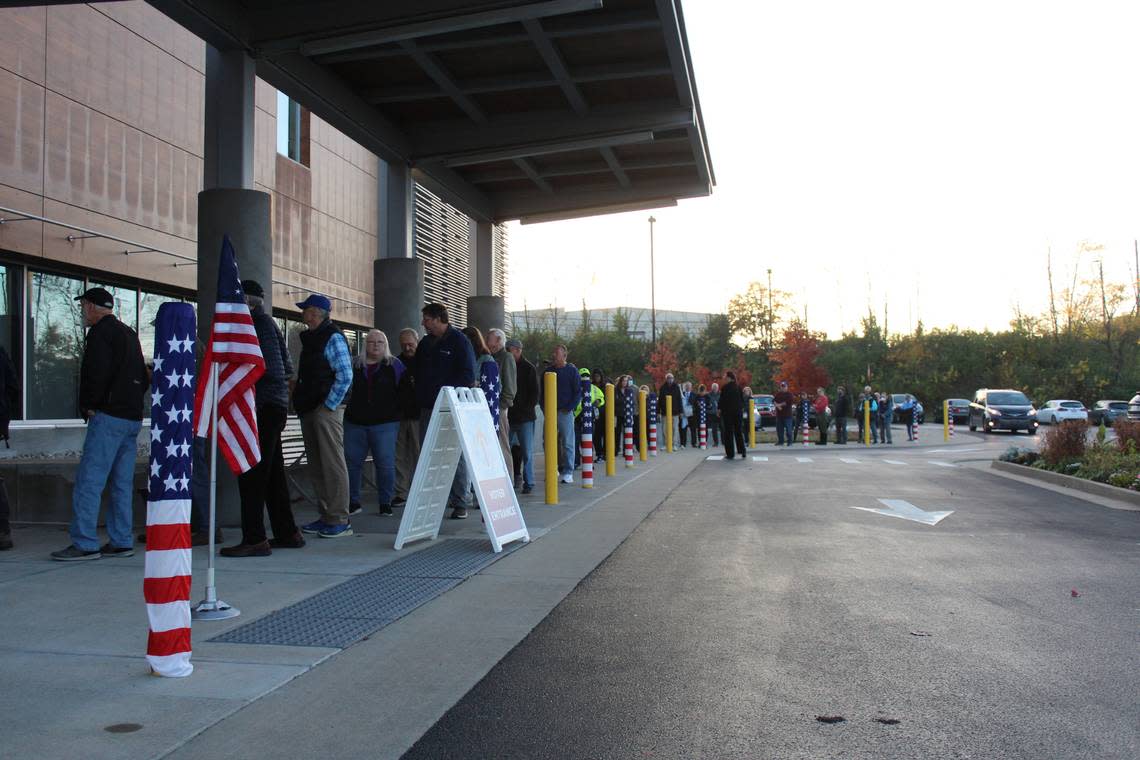KY lawmakers grill elections officials about long lines, delays in reporting results
Although Kentucky’s general election on Tuesday ran smoothly in many ways, there were unacceptably long lines of voters in some places and unusual delays in the online reporting of election results, state lawmakers said Thursday.
The Legislative Oversight and Investigations Committee met in Frankfort to question officials from the state Board of Elections about problems with the 2022 elections.
At the hearing, state Rep. Jason Nemes, R-Louisville, played a video he made of several hundred voters standing in line outside South Oldham Middle School in Crestwood about 10 minutes before polls were scheduled to close Tuesday evening.
Some voters were elderly and in wheelchairs, some had small children with them, and some finally gave up and left, Nemes said.
Oldham County, with a population of about 69,000, had only five polling places on Tuesday despite warnings ahead of time from elected leaders including House Speaker David Osborne, who represents the county, Nemes said.
“That is 100 percent, absolutely, completely, no way other to say it, unacceptable. If it had rained, I don’t know what would have happened,” Nemes said. “This is voter suppression. That’s what this is.”

Lawmakers asked the state Board of Elections why it approved some counties’ plans for polling places despite an obviously inadequate number of voting locations. Overall, the state board’s website identifies 1,464 voting locations statewide.
Karen Sellers, the board’s executive director, told lawmakers her staff reached out to all 120 county clerks to be sure they were prepared for heavier than normal voter turnout in this year’s midterm elections.
It’s the county clerks and county boards of elections who draw up plans for voting locations, which the state board approves, Sellers said.
“Yes, there were lines,” Sellers said. “Possibly there should have been some more foresight on our part. ... I’m sure that the lines we had in this general election will certainly be taken into account when any new plans are developed in the future. And I do believe the county clerks will do that as well.”
However, local officials are going to need more money in order to hire the necessary staff on Election Day, said Jason Denny, president of the Kentucky County Clerks Association.
Some Kentucky counties pay as little as $60 to poll workers for what is essentially a 16-hour workday, said Denny, who is the Anderson County clerk. That does not attract too many volunteers, and without volunteers, there can be no additional polling places, he said.
“Money,” Denny said. “That’s at the top of the list to solve a lot of these problems.”
Apart from money, the angry political mood has discouraged people from volunteering to work at polls, said Taylor Brown, general counsel for the state Board of Elections.
“There’s a real problem with recruiting poll workers right now. The threats that are out there ... For whatever reason, people get charged when they go to vote sometimes. And we’re losing poll workers,” Brown told lawmakers. “Given the opportunity to consolidate (local voting locations), the clerks took it.”
In his own presentation, Secretary of State Michael Adams said election conspiracy theorists and political sore losers “besieged” county clerks’ offices with lawsuits and open records requests this year in an attempt to disrupt their preparations for the elections.
“This abusive process places real strains on our elections infrastructure, including our human resources,” Adams said.
Only two county clerks quit in 2020, compared to nine who quit this year, Adams said. Another 14 chose not to run for re-election, he said.
On another issue, state Rep. Ken Fleming, R-Louisville, asked why the Board of Elections’ website took so long on Tuesday to publicly report the election results.
Ten counties’ results were not posted on the site until Wednesday or later in the week despite the county clerks forwarding them to the state on Tuesday, and only partial results were posted for other counties, like Fayette.
Also, in at least a few cases, the board’s website briefly posted erroneous election results, causing confusion, lawmakers said.
The board’s website should be a source of fast, accurate information on election night, Fleming said.
“The media is depending on this, we’re depending on this,” Fleming said. “It was totally a frustration for everyone I talked to about that.”
Brown, the state board’s lawyer, said the delays and other problems were due in part to the board switching software platforms for their website. The board dropped a foreign vendor and “brought it in-house,” with Tuesday being the first general election for the new platform, he said.
“This is a very, very, very, very intricate website that needs plugged in from 120 counties throughout the state,” Brown said. “This being our first time, I think — everyone was used to getting results five, six hours after the close of polls. Right now (on Thursday afternoon), I believe if you look at our website, we’ve got everybody reporting.”
“Martin County, right now, hasn’t reported,” Nemes told the lawyer. “They haven’t started reporting, according to your website. I’m looking at it right now.”






